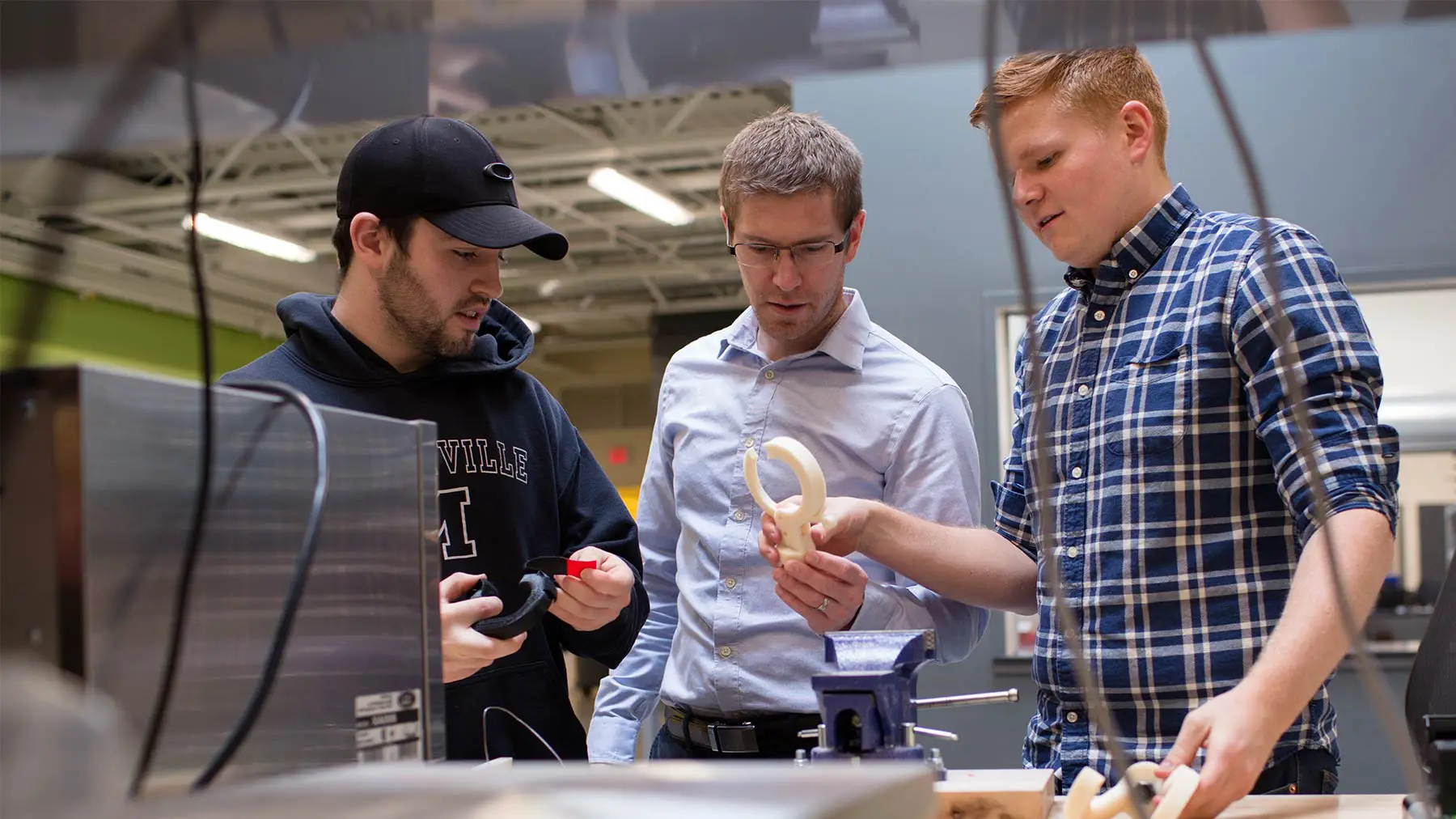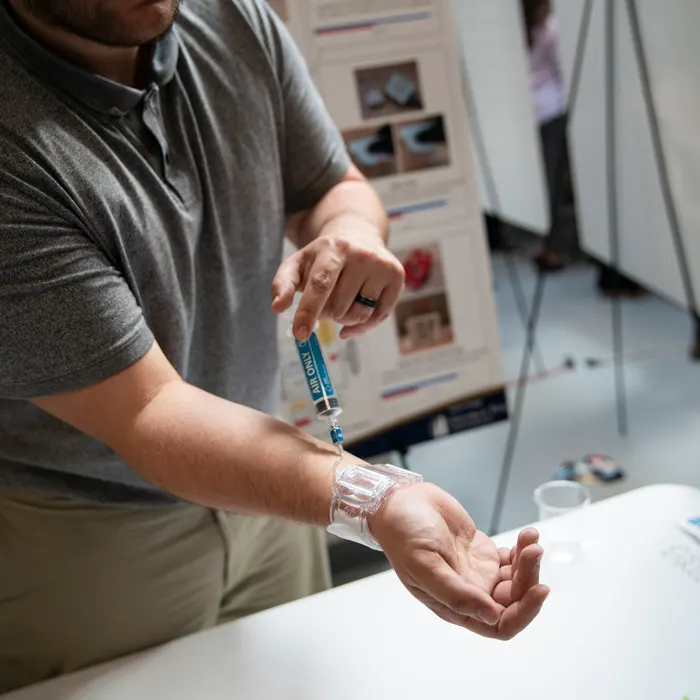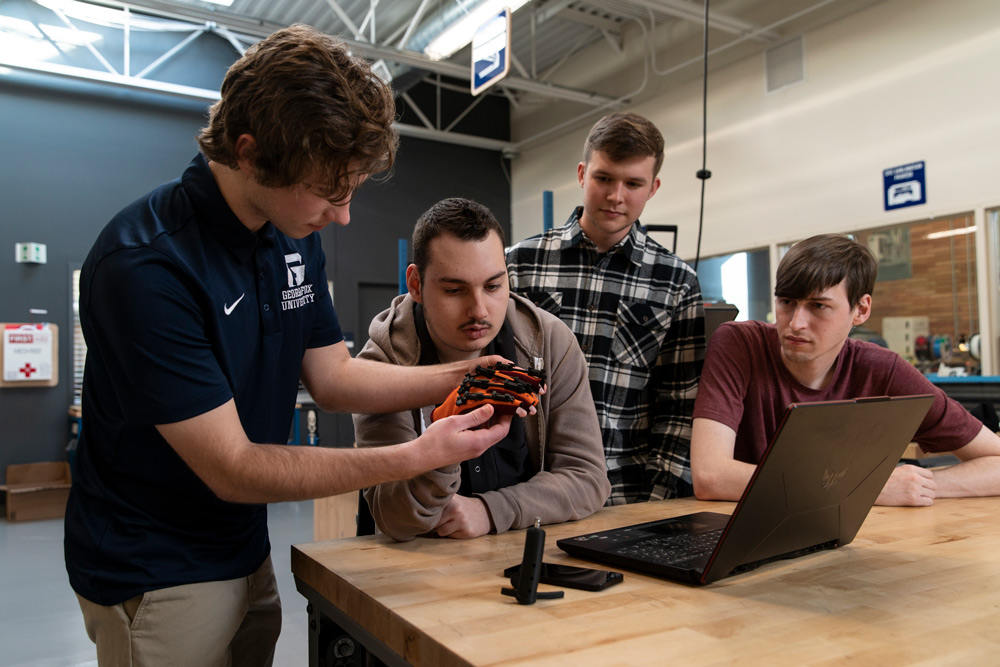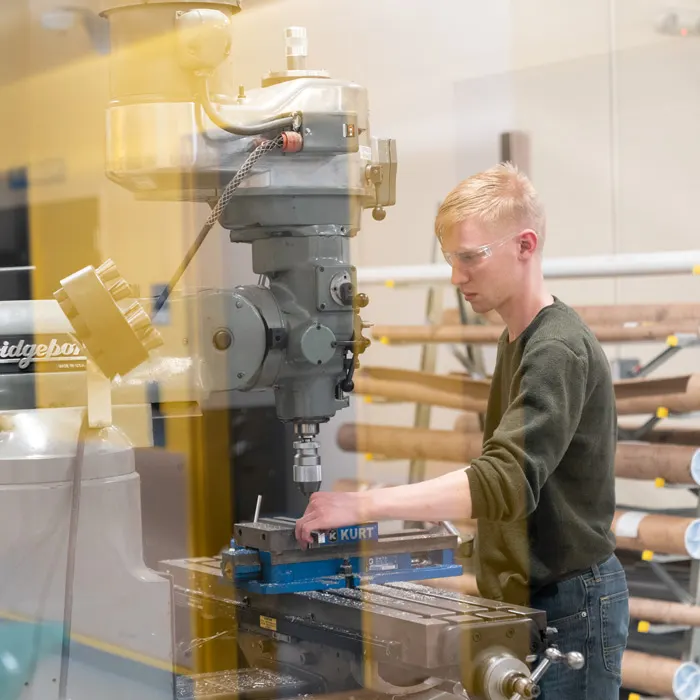
Biomedical Engineering Concentration
At A Glance
Program Type
Concentration of the engineering major (BS)
Accreditation
Northwest Commission on Colleges and Universities (NWCCU), Accreditation Board for Engineering and Technology (ABET)
Recognition
U.S. News and World Report “Best Undergraduate” engineering program
On this page:

You’re eager to join the medical arena, but sticking people with needles or performing operations aren’t exactly your thing. Here’s some good news: biomedical engineering lives at the intersection of engineering and healthcare, and the solutions developed in this field can prolong and save lives. What role will you play in this high-impact, life-changing profession?
Biomedical engineers use engineering ingenuity to solve medical and health-related problems. Often they do research in tandem with scientists to develop and evaluate things such as artificial joints and organs, prostheses, instrumentation, medical information systems, and health management and care delivery systems. If this sounds intriguing, the biomedical engineering concentration within our engineering major may be right for you.
- #1 Christian engineering program in the West - U.S. News (2025)
One Concentration, Two Tracks
At George Fox, you have the option of two biomedical engineering tracks:
- A medical device sequence that specializes in the design of devices used for medical procedures
- A pre-health sciences track that incorporates the chemistry and biology prerequisites needed to become a highly qualified applicant to medical school, a doctor of physical therapy program, or numerous other health-focused professions upon graduation.
Develop a Prosthetic Limb or an Artificial Heart Valve
The biomedical engineering field covers a broad spectrum, combining aspects of mechanical engineering, electrical engineering, materials science, chemistry, mathematics, human biology, and computer science and engineering to improve human health, whether it be to develop an advanced prosthetic limb, an artificial heart valve, or make a breakthrough in identifying proteins within cells.
You could also specialize in pharmaceutical delivery systems and tissue engineering, or develop biomechanical sports equipment. Or, you may design surgical instruments, medical imaging systems, or create devices such as heart pacemakers or those used to automate insulin injections.
Read more about what biomedical engineers do and the career possibilities that await!

Servant Engineering: Creative Solutions for the Underserved
We take Christ's call to use our God-given gifts and abilities to serve others. To put that into practice, the Servant Engineering program is a core curricular requirement. In it, you will team up with industry professionals to research, design and deliver engineering solutions to address humanitarian needs.
All our third-year students work on interdisciplinary teams, creating solutions to significant technical challenges through a human-centered design approach.
Among our recent projects:
- Clean cook-stove technologies for meeting the basic needs of refugees, impoverished people and communities in the developing world
- Augmentative communication and physical therapy devices for patients and staff at the Providence Center for Medically Fragile Children in Portland
- Design of a bridge at a ranch for fatherless youth in Yamhill, Oregon
- An auto-resistive enhancement to an exercise bicycle for use in focused physical therapy
- Rugged wheelchair designs for individuals suffering with cerebral palsy in the slums of Nairobi, Kenya
- Creation of a prosthetic device to assist one of our own – an engineering student born with symbrachydactyly, a condition characterized by limb abnormalities
- Design of “The Bouncinator 3000,” a custom-made device that gives a young girl with physical disabilities newfound freedom
Mentorship Opportunities
Students in the engineering program have the opportunity to engage in industry mentorship through the Ignite program. As an Ignite member, you are matched with Christians in the industry. You’ll meet monthly to discover opportunities, develop connections, address career gaps, and ask questions.
Program Distinctives Why Study Biomedical Engineering at George Fox?
-
Gain hands-on experience starting your first year with project-based courses.
-
Our network of industry partners gives you an inside track to internship opportunities.
-
Our wide-ranging course of study will prepare you for either industry or graduate work in biomedical engineering, physical therapy and other health-related disciplines.
-
You will spend your junior year doing a year-long design project that serves a global need.
-
You will engage in a year-long multi-disciplinary (e.g. electrical and biomedical engineering) senior design experience that offers real world application.
Courses / Curriculum What Will I Study?
As a biomedical engineering student, you will learn:
- Medical device design from design concept to market
- How to build devices that measure temperature, pressure, and other biosignals
- The properties and behaviors of biomaterials and how to use them in medicine and healthcare
- How to model the motion of the human body mathematically
- How to apply biotransport phenomena for developing artificial tissue and medical devices
- A human-centered approach to engineering design
Cornerstone Core
The Cornerstone Core is a set of 12 courses across 10 academic disciplines that undergraduate students take at George Fox to cultivate their character within the Christian context.
As an alternative to Cornerstone Core, students can participate in our great books honors program.
Biomedical Engineering Requirements
×Biomedical Engineering (53-54 credit hours)
Complete the following courses
Choose one of the following three sequences:
Medical Device Sequence
Pre-PT Sequence
Pre-OT Sequence
Bachelors (BS) in Engineering Requirements
×Required for all concentrations
Complete the following:
Complete the following.
Concentrations (53-55) - choose one
Complete the following courses
Choose one of the following three sequences:
Medical Device Sequence
Pre-PT Sequence
Pre-OT Sequence
Complete the following
Complete the following:
Complete the following
Choose one additional math or science elective from the following:
Complete the following
Choose one additional math or science elective from the following:
Complete the following:
Choose two of the following:
Choose one of the following:

Our spaces/Where Will I Learn?
Maker Space: Where Innovative Ideas Come to Life
The facility includes:
- A 24-station computing lab
- Eight meeting rooms with 48-inch monitors
- A wood shop with a large computer numerical control (CNC) router
- A metal shop with a CNC milling machine
- And so much more
These spaces surround an open configurable collaboration space known as "the Hub," a 6,000-square-foot area used by students representing a wide range of majors. The computer labs have the processors and computer systems needed to accommodate the demands of our major.
Career Outlook What’s After George Fox
Employment of Bioengineers and Biomedical engineers is projected to grow 5% from 2024 to 2034, according to the U.S. Bureau of Labor Statistics, faster than the average for all occupations.
Bioengineers and biomedical engineers are expected to see employment growth as demand for biomedical devices and procedures, such as hip and knee replacements, continues to increase. The majority frequently work in research and development or quality assurance.
- Electrical Failure Analysis Engineer, Intel
- Embedded Software Design Engineer, Tektronix
- Semiconductor Design Engineer, Teradyne
- Reliability Engineer, Lattice Semiconductor
- Various engineering positions, Daimler Trucks North America
- Applications Engineer, MCAD Technologies
- Development Engineer, Contech Engineered Solutions
- Project Engineer, Anderson Construction
- Civil Design Engineer, KPFF Consulting Engineers
- Teradyne, Portland
- CUI, Portland
- Intel, Beaverton, Oregon
- Lattice Semiconductor, Portland
- HP, Boise, Idaho
- 3D Systems, Wilsonville, Oregon
- Tektronix, Beaverton, Oregon
- Climax, Newberg, Oregon
- Cascade Steel, McMinnville, Oregon
- MIT (Mechanical Engineering)
- Cal Poly (Electrical Engineering)
- Johns Hopkins University (Biomedical Engineering)
- Purdue University (Mechanical Engineering, Astronautics Engineering)
- USC (Astronautical Engineering)
- Virginia Tech (Biomedical Engineering)
- Wake Forest (Biomedical Engineering)
- UC San Diego
- Oregon State University (Electrical/Computer Engineering, Civil Engineering, Mechanical Engineering)
- University of Washington (Electrical/Computer Engineering, Mechanical Engineering)

Engineering Hope
For Grace Tully, a biomedical engineering student, her work is more than engineering medically necessary devices; it’s about engineering hope and being a patient advocate.
“In the biomedical engineering field, the constant focus is that everything you do is to improve patient outcomes,” Grace says. “It’s the patients – they are No. 1.”
Madelynne Pirkl
In the four years I was at Fox I became a much more confident, independent and well-rounded human being, while also developing the training and knowledge that I need to be a great engineer.
Chat with a current student
Hobbies & Interests: #Exploring, #Traveling, #Concerts, #Friends&family, #Shopping
About Me: Hey!! My name is Lauren and I'm from Tucson, Arizona! I'm a biomedical engineering major here at Fox. Right now I'm open to where that leads me for...Read more
Ask Me About: Out of State Students
“What’s your favorite class?”
“What’s the best student event?”
Request Information About Biomedical Engineering
